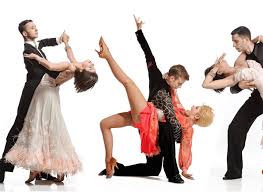How to Get Ready for a Dance Competition
Final simulations
This technique helps dancers dance their new routines, back to back, to music in a simulated competition environment. That allows dancers to develop their endurance and perfect their dancing technique only without the stress of the real competition.
Mental Preparation before the competition
Sometimes, newbie dancers don’t realize the significance of the mental preparation for a dance competition. It is almost as important as the physical preparation or perfecting the routines. Clearing your mind and getting 100% focused on your dance competition may not be as easy as it seems. Clear your mind of all toxins and tap into your motivation before you get out on the dance floor. A couple of yoga classes, an hour of meditation or just a few hours of doing something other than dancing can do wonders for you.
Motivation
The right motivation before a dance competition is almost as important as your dancing. While dancing, many amateur dancers put too much thought in the technical aspects. They get too focused on their routines, moves, ranking, and forget about having fun while dancing. Oftentimes it may make the dancer look stiff and effects their dancing in a negative way. Judges can usually tell when this is happening since it is so obvious for the trained eye. Try to keep technical thoughts only for training in the preparation phase. When the time of the competition comes, all you need to be focused on is the joy of dancing. The reason why all professional couples always look like they are having fun simply is because they actually do. In many cases that will help you dance your best and make you look better.
Start your preparations well in advance
Try to keep your mind clear of last minute problems before your competition. Finding the best competition dress for yourself can be time consuming and sometimes quite frustrating, especially if you waited until the last minute. Start getting ready for your competition well in advance. You need to free your mind of unnecessary last minute worries that can affect your performance. The only thing your should be focused on is the upcoming competition and your dancing. Before the competition, stress levels go up. That is why you should find yourself everything you need – a dancing dress, dance shoes and accessories, well in advance. Sometimes dancers tend to get so absorbed by perfecting their routines, that they just leave all preparations for the last moment. And then before they realize it, there’s no time left for finding an appropriate ballroom dress. Very often it is very difficult to find an appropriate competition gown and custom dance dresses usually take at least 3-4 weeks to be delivered from the time an order’s been placed. That’s why finding yourself a quality Smooth, Standard or Latin dress should be among your top priorities while getting ready for a dance event. Usually the Standard and Smooth ballroom dresses require more time for production.
The competition hairstyling and makeup shouldn’t be underestimated as well. It’s recommended that you leave your dance makeup and hairstyle to the professionals. Since the professional ballroom hairstylists and make-up artists usually get extremely busy during the days of the competition, you should book your hairstyle and makeup appointment as early as possible, at least a couple of weeks before the event.
Some of the best professional ballroom dancers say that over 50% of dancers’ success on the competition depends on the way they look on the dance floor. That involves the entire look: the dance costumes, followed by the competition hairstyling and make up. A good quality Latin dress or a Standard gown can enhance a dancer’s performance and can be of crucial importance for their final ranking. Some of the best dancewear companies sell their dance dresses with matching accessories which could save you time and ultimately money.
In case you need to get yourself a new pair of ballroom shoes before the competition, try not to do that at the last minute. Get your dancing shoes at least two weeks before the competition so you can practice with them. Try to avoid buying a new brand or style of shoes you haven’t used before right before your competition. Same applies to the dancing dress. Its recommended that you get your competition gown at least one week in advance so you have enough time to practice with it and make sure it fits well and doesn’t impede your moves.
Nutrition and Diet
Believe it or not, your eating schedule in the last 2 weeks before a dance competition can be crucial for your success. A proper diet would give you the strength and stamina for a great performance on your competition. Contrarily, a poor diet can affect your performance in a negative way.
Although your body’s definition, strength and energy level are more a result of maintaining a healthy lifestyle in general, yet what you do in the last couple of weeks can significantly affect your dance routine performance.
It is highly recommended that you avoid any heavy foods rich in fats and cholesterol. Switching over just foods high in protein or even starving right before a dance competition is a very common mistake.
Let’s keep in mind that two weeks of eating properly cannot compensate years of eating unhealthy food. Your best bet is instead of trying to get the dream dancer’s body in just a few weeks by pushing yourself to the limits of exhaustion, you should try to get the best out of what you already have. Keeping a positive nitrogen balance is crucial for your stamina, I.e. your overall performance. Maintaining high energy level is more important than having a leaner but fatigued body. Yet, losing maybe a few pounds before a dance competition might help you feel better. It might not affect your performance in a negative way if it is done properly. Remember that if you feel like you need to loose a few pounds before a competition you should do this slowly and gradually. Loosing too much weight in a short period of time doesn’t lead to anything good. It is not recommended to loose more than a couple of pounds, within the last 2-3 weeks right before your event.
Two weeks before the competition
– Keep fat intake to minimum.
– Increase carbohydrates intake in the mornings. Good sources of carbs are: brown rice, whole grains, vegetables and pasta.
– Increase protein intake in the afternoons. Good natural sources of protein are: fish, white chicken meat, egg whites.
– Drink tons of water. Water helps body sells dissolve fat quicker than anything else. Along with that, water keeps you hydrated and energized.
– Avoid salt. Salt contains sodium and sodium keeps the water inside the body. Which makes you feel heavy and makes your face look puffy.
– Take a lot of vitamins. Preferably through natural sources – organic fruits and vegetables.
Right before the competition
– Make sure you eat something small. Dancing on a full stomach is almost as bad as dancing on an empty stomach. If you don’t eat at all, then you risk to have no energy on the dance floor when you need it most. An energy bar or cereal bar will do.
– Drink a glass of water. You don’t want to get your stomach too full or get dehydrated on the dance floor. Dehydration can be very dangerous and may lead to muscle cramps or even black outs.
– Light dinner before 8.00 p.m on the night before, go to bed for 7 hours, more sleep will make you feel drowsy in the morning. A high energy breakfast, protein bar, a glass of water + a little coffee can boost your energy before the competition. Avoid eating too much in the morning right before a competition.
Stretching and Warming up
Nice warm up and stretching is very important before you get on the dance floor. Try to not overload your body and keep your energy for the dance floor. It is not recommended to practice intensively the night before your competition. Y ou may injure yourself or get burned out. It is recommended you should try to relax and get emotionally ready for the important day.
Learn how to move on
Every ballroom professional knows how important it is to always move through a dance routine. Even if you made a mistake, lose timing, miss steps, get in another couple’s way or fall down, move on and keep dancing as if nothing happened. It may even help you conceal some small errors and make them unnoticeable to both judges and audience.
Don’t allow one error to affect the remainder of your dance performance. Learning how to keep your focus on your next dance steps and routine can put you one step ahead of your competitors.
Many amateur dancers tend to believe that a mistake they made would put a negative mark on the remainder of their performance which is not necessary the case.
























